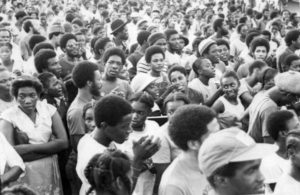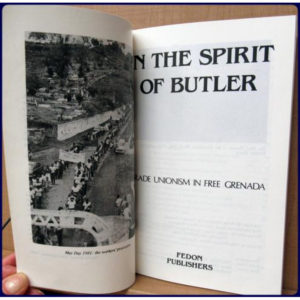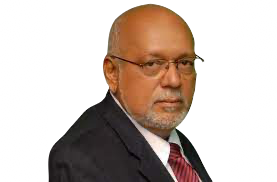|
Getting your Trinity Audio player ready...
|
Reading Time 15 mins
Presentation by former President of Guyana Donald Ramotar, featured Speaker on the occasion of the 43rd anniversary of the Grenada Revolution, Saturday, March 13, 2022.
March 30, 2022
 I would first of all thank the organizers for inviting me to share some of my views with you on this important 43 anniversary of the most profound Revolution that occurred in the English-speaking Caribbean. Allow me to greet all of you on this significant occasion.
I would first of all thank the organizers for inviting me to share some of my views with you on this important 43 anniversary of the most profound Revolution that occurred in the English-speaking Caribbean. Allow me to greet all of you on this significant occasion.
For me, the Grenada Revolution was a continuation of the movement for real change in this Region by many revolutionaries and movements in this area’s long history of struggles for Freedom. Among these were Dr. Cheddi Jagan and the People’s Progressive Party (PPP), which he founded. Indeed he began to raise the people’s consciousness in very adverse conditions in the mid-1940s. Recall that we were all conditioned to believe that we were inferior to the colonial masters in that period. Since we were children, we sang “Rule Britannia Rule” and “God Save our King and Queen.” So profound was his impact in the Region that by 1949 he was banned from entering many sister Caribbean Colonies. Our minds, according to Bob Marley, were being freed.
He was a profound believer in Caribbean unity and instilled an internationalist outlook in the PPP. One of the early acts of solidarity by the PPP was towards the working people of Grenada. During the great general strike in Grenada in 1951, which shook the colonial authorities to the core, the PPP started a campaign in British Guyana to inform the Guyanese people and to extend solidarity to that important struggle in which the Colonial authorities gunned down many unarmed workers. We in the PPP were taught to see those struggles as our own.
The PPP worked hard to raise money to support the working people of Grenada. It collected the sum of $111.40 a princely sum at that time and sent it to the island. It sent protest telegrams to the United Nations Secretary-General and its Human Rights bodies as well as to the Secretary of State for the Colonies in London drawing attention to what was happening on the island and protesting the acts of the colonialists. I am also aware of the untiring work that the PPP and Cheddi Jagan in particular did to assist the formation of anti-imperialist, pro-working people’s organizations in the Region as a whole.
Therefore, today I feel honored and privileged to have this opportunity to address you. I see it as a continuation of forging an independent patriotic Caribbean movement to continue the struggles of those who came before in different circumstances but with the same objective i.e. uniting the Region on the sound basis of Independence, sovereignty, dignity, and Freedom.
“The Grenada Revolution of 1979 did a great deal for the whole region … it brought a great feeling of dignity, a feeling of great pride to all Caribbean patriots.”
The Grenada Revolution of 1979 did a great deal for the whole Region and in advancing the causes I just mentioned. It not only expelled the dictatorship of Eric Gary but from the very beginning, it brought a great feeling of dignity, a sense of great pride to all Caribbean patriots. That was the first positive impact of the Revolution. It expressed the profound intolerance of oppression by our people.
We were also fortunate to have had in the leadership of the New Jewel Movement leaders who had a correct grasp of the situation. If we look back at some of the interviews given by the New Jewel Movement (NJM) leaders before the 1979 victory, we will see this clarity in a very stalk way. Bishop’s interview in 1977 with the Cuban publication Bohemia is a good example.
 Allow me another personal reflection. Maurice Bishop came to Guyana in the mid – 1970s to help us at the trials of one of our party militants, Arnold Rampersaud. While here, he met people at several private and public meetings, and I was most impressed with his deep empathy for the Caribbean working people. He endeared himself to the people of this country by the stand he took. He appreciated that advancement of the cause of the Guyanese people was defending the people of Grenada and the whole Caribbean.
Allow me another personal reflection. Maurice Bishop came to Guyana in the mid – 1970s to help us at the trials of one of our party militants, Arnold Rampersaud. While here, he met people at several private and public meetings, and I was most impressed with his deep empathy for the Caribbean working people. He endeared himself to the people of this country by the stand he took. He appreciated that advancement of the cause of the Guyanese people was defending the people of Grenada and the whole Caribbean.
I had the opportunity to listen to Comrade Selwyn Strachan, another young leader of the Party, addressing the delegates of a PPP Congress in 1976. I was most impressed with the quality of this Grenadian comrade who was representing the NJM. Already I thought the NJM was one of the leading organizations in the Region not only because it was a party with mass support but the quality of its leadership.
In the just over four years that the Revolution lasted, it gave us another example of governance still relevant today. That was how it narrowed the gap, even bridged the gap between the governed, the people, and the administration.
“The Grenadian people had become the most conscious and advanced people in our region and championed the cause we all shared. It was an embodiment of the Caribbean’s hopes and dreams.”
The mass consultations created a feeling of oneness never witnessed before or after. The Grenadian people had become the most conscious and advanced people in our Region and championed the cause we all shared. It was an embodiment of the Caribbean’s hopes and dreams. Moreover, the Revolution in Grenada occurred in an atmosphere of tremendous up-surge both regionally and internationally. The decade began with the victory of the Unidad Popular in Chile and ended with the victory of the NJM in Grenada and the Sandinistas in Nicaragua.
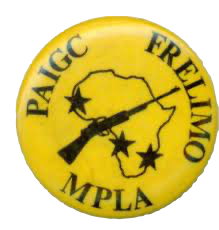 In between these, some momentous events occurred. The liberation movement in Africa was on the upsurge. Portuguese colonialism was collapsing under the blows of the liberation movement in Angola (MPLA), Mozambique (FRELIMO), and Guinea Bissau (PAIGC). The impact of those struggles was so profound that it led to the collapse of the Fascist regime in Portugal in 1974, creating the conditions for the Independence of the colonies and the removal of one of the most brutal governments in Europe.
In between these, some momentous events occurred. The liberation movement in Africa was on the upsurge. Portuguese colonialism was collapsing under the blows of the liberation movement in Angola (MPLA), Mozambique (FRELIMO), and Guinea Bissau (PAIGC). The impact of those struggles was so profound that it led to the collapse of the Fascist regime in Portugal in 1974, creating the conditions for the Independence of the colonies and the removal of one of the most brutal governments in Europe.
In the meantime, the struggles in Southern Africa had reached a level where it was almost impossible for the Apartheid regime to crush it. We all recall the Soweto uprising that was sparked first by students but joined by working people in the whole country. It heralded the creation of more mass organizations, all of which were taking leadership from the ANC. That was the beginning of the end of the Apartheid racist regime.
In Asia/Middle East, the masses rose and overthrew the Shah of Iran who was in power since 1953. The revolution tide was rising. In that era, the most significant victory was that of the Vietnamese people, who forced the US army out of its country and reunified Vietnam in 1975. This was a triumph not only for Vietnam but for those who stood with that heroic people through almost four decades of bitter struggles. Except for the setback in Chile in 1973, that decade saw a significant forward movement for the revolutionary-democratic and peace forces throughout the world.
However, what was not fully realized at the time was that these victories came at the end of a long wave cycle which began at the end of WW2. It was a juncture in world history that saw the beginning of a revival of the old reactionary forces determined to stop and reverse the people’s gains. This began with the coming to power of Margaret Thatcher in the UK and Ronald Reagan shortly after in the United States. They formed a very aggressive alliance that is still determining quite a lot in our world to this day.
The intention of the US ruling class to halt the progressive victories was first seen immediately after the Saur Revolution in Afghanistan in April 1978. At that time, President Carter was still in office, and it was almost a year before the Grenada Revolution. Nevertheless, at a NATO Council meeting in Washington, it was agreed to increase the military budgets of all NATO member states by 3% per year until the end of the century. This was a signal that the imperialist offensive was about to be unleashed.
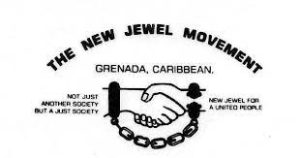 In this period, too, the US began to deploy more than 600 tomahawks and cruise missiles in Europe ostensibly to deal with the “Soviet threat” to Europe. As a result, the Cold War, which had cooled off with détente, was reignited with great force.
In this period, too, the US began to deploy more than 600 tomahawks and cruise missiles in Europe ostensibly to deal with the “Soviet threat” to Europe. As a result, the Cold War, which had cooled off with détente, was reignited with great force.
The United States had become very impatient with the developing countries’ Anti-Imperialist stance in fora like the United Nations, and the Non-Aligned Movement thus the US resolved to pressure them to fall in line.
As far back as 1976, Henry Kissinger told the Senate Foreign Relations Committee, “The hostility of some of the Third World spokesmen and bloc voting have made constructive decisions in the UN forums…almost impossible. I have instructed each US Embassy that the factors by which we will measure the value which that government attaches to its relations with us will be its statements and its votes on…issues which we indicate are of importance to us in the international forums.” This is even more evident today as we witness our Caribbean countries on bowed knees kissing the hand of the US in relation to the present situation in Europe.
“This was a getting tough position by the US. It was in this environment, the beginning of imperialism’s push back that the Grenada Revolution was born. This means that Grenada was not to have a respite for a single day.”
This was a getting tough position by the US. It was in this environment, the beginning of imperialism’s push back, that the Grenada Revolution was born. This means that Grenada did not have a respite for a single day. It was not to be given anytime to consolidate. Imperialism wanted to extinguish the example it was rapidly becoming not just for other Caribbean islands but also for the rest of the developing world, particularly for small developing states.
In these unfavorable conditions increasing criticism and slander from imperialism, Grenada began to progress in developing its economy. Moreover, the economy’s growth saw not just a tiny section of the population getting rich as we have seen so often in the Region, but the distribution of wealth saw the whole nation benefit. It was grassroots, people’s democracy at work.
In a very short while, Grenada had become a shining example with mass participation at almost all levels of decision-making. This was truly revolutionary, truly groundbreaking. As the pressures from imperialism increased, the NJM resisted and moved closer to the socialist countries. The reforms became even more popular and far-reaching. Unfortunately, the Revolution came crashing down in October of 1983. In looking back from this vantage point, we can see that some of the mistakes made were similar to those of other revolutions.
One of the things that occur after any real revolution is the tremendous release of the energy of the masses. It creates much enthusiasm that revolutionaries could easily make mistakes by not recognizing that such enthusiasm cannot be sustained over the long haul. Therefore what is needed is to consolidate gains while pushing forward more purposefully. Marx and Engels hinted at this in the Communist Manifesto, particularly regarding economics. They said that workers would take political power rather quickly, but economic power must be taken by “degree,” meaning slowly. Engels was even more explicit in his booklet “Principles of Communism.” These positions were taken for many reasons, one of which was to avoid the destruction of the economic life of a country, which invariably was shouldered by the working people. Lenin found this out shortly after the Bolsheviks took power and after the civil war ended. This is why he came up with a New Economic Policy (NEP).
While I cannot identify mistakes made in the economy by the NJM. The economy improved a lot, and social condition was greatly advanced with rapid progress in Health Education, etc. However, I think that over-enthusiasm in the political arena led to some political mistakes in the politics of the NJM. I believe that there was possibly an underestimation of the strength of imperialism and the extent that they were willing to go to crush the Revolution. Even though many leaders spoke about the possibility of physical intervention by the US, it seems to me that many thought that was unlikely.
“The [Torchlight Newspaper] was an inconvenience that should have been tolerated.”
One such mistake in the political arena was the failure or the refusal of the NJM to hold elections in the country. With the benefit of hindsight, that would have gone a far way in consolidating and institutionalizing the Revolution. Such a step would have removed one of the main planks of attacks on the Revolution and would have served to restrain imperialist aggression. Moreover, institutionalizing the Revolution may have reduced the friction in the leadership of the NJM. I have no doubt too, that the NJM would have won those elections handsomely if they were held. That seems now to have been a serious error.
I believe that we should move with some alacrity to institutionalize the gains of the future Revolutions in the future. Writing Constitutions with mass participation and creating peoples assemblies, that is: Parliaments or other representative bodies corresponding to a nation’s history etc. We should also consider how much the closing down of the “Torchlight” newspaper affected the Revolution. Having not been on the spot, I reluctantly make this point. However, I believe that the NJM could answer all attacks and to win out in any debate with the paper. It may have been better to engage the press more aggressively than just shutting it down. In Grenada’s case, having just emerged from a period of dictatorship, it may have raised unnecessary trepidation among the middle class and possibly alienated an influential section of the population from the Revolution.
The forcibly closing down of the paper tarnished the image of the Revolution among potential allies such as Social Democratic and Socialists. I do not believe that that was necessary. The paper was an inconvenience that should have been tolerated. I would not dwell for too long on the mistakes of the Party. A lot has been said and written about this in the past, and many of the mistakes are obvious. What I believe was a serious error was the total focus on government and apparent neglect of the Party that had a negative impact on the Party’s development. What was needed was not a smaller party but a more mass party, a bigger party. I believe that some of the leaders were beginning to recognize this. Fidel Castro in his speech at the funeral of the Cubans, who died in Grenada, said that in his last talk with Maurice Bishop, Bishop told him that he, Maurice, needed to pay more attention to mass organizations.
“Fidel Castro in his speech at the funeral of the Cubans, who died in Grenada, said that in his last talk with Maurice Bishop, Bishop told him that he, Maurice, needed to pay more attention to mass organizations… Instead, the party became a sect.”
Instead, the Party became a sect. The membership was too small and that had, in my view, a serious impact on the management of the country and the Party. People were overworked, fatigued, and exhausted. The responsibilities fell on too few. More comrades, conscious comrades, were needed to accomplish the revolutionary agenda. That may have contributed to lessening disagreements, even jealousies and other human weaknesses that emerged. Those problems were subjective, not objective.
I think that the first major mistake that contributed to the crisis was the creation of dual leadership in the Party, the failure to recognize that Maurice Bishop was irreplaceable in the eyes of the masses. He was the symbol of the Revolution; he embodied the hopes and aspirations of the masses. Few leaders were loved as Bishop. Moreover, he had a deep understanding of the issues, as seen by the speeches he delivered in many forums. On reflection, he had all the qualities needed at the stage of the Grenadian Revolution.
He may not have been a top-notch theoretician, but he had an intuitive grasp and an unerring feel of the people’s sentiments and moods. Failure to appreciate that subjective factor was a fatal mistake. Maybe the most fatal. As a result, Grenada became the first victim of a resurgent imperialism. Recall the US war machine was held in check after Vietnam. It launched the furious offensive on October 25 1983, which continues to this day.
Today the same forces that snuffed out the Grenada Revolution are largely responsible for the situation in Russia/Ukraine. They have created one of the most dangerous situations in the world. They can push the world towards a nuclear catastrophe.
 The crisis did not happen on February 24, 2022, the date Russia’s army entered Ukraine, as is being pushed in the media. It was in the making since 1997 when the Clinton Administration decided to take advantage of Russia’s economic crisis and to push NATO to its borders. The main goal in my mind was to ensure that Russia never again becomes a competitor of the US. This is certainly not an ideological struggle. Russia is a capitalist country. The expansion of NATO, coupled with the withdrawal of the US from almost all the arms control treaties created grave suspicions in Russia as to the real intentions of the US. Remember, too, in 1999, the US/NATO bombed Yugoslavia for 78 days straight. Russia became very suspicious of the US’s main intentions.
The crisis did not happen on February 24, 2022, the date Russia’s army entered Ukraine, as is being pushed in the media. It was in the making since 1997 when the Clinton Administration decided to take advantage of Russia’s economic crisis and to push NATO to its borders. The main goal in my mind was to ensure that Russia never again becomes a competitor of the US. This is certainly not an ideological struggle. Russia is a capitalist country. The expansion of NATO, coupled with the withdrawal of the US from almost all the arms control treaties created grave suspicions in Russia as to the real intentions of the US. Remember, too, in 1999, the US/NATO bombed Yugoslavia for 78 days straight. Russia became very suspicious of the US’s main intentions.
Despite several protests from Russia, despite warnings from numerous knowledgeable persons on international relations, including Henry Kissinger and Jack Matlock one of the last US ambassadors to the USSR, the US and NATO continued their eastward expansion. Ambassador Matlock, a man of vast experience told the US Senate Foreign Relations Committee the following as far back as 1997 “…I consider the administration’s recommendation to take new members into NATO at this time misguided. If the United States Senate should approve it, it may well go down in history as the most profound strategic blunder made since the end of the Cold War. Far from improving the security of the United States, its Allies, and the nations that wish to enter the Alliance, it could encourage a chain of events that could produce the most serious security threat to this nation since the Soviet Union collapsed.” His words uttered twenty-five years ago were very prophetic.
Having protested for more than thirty years after having tried diplomacy, Russia has lost confidence with all the talks and diplomatic maneuvers. They most likely felt that talks were being used to buy time and eventually give them all a fait acompli, i.e., Ukraine entering NATO. As a result we are now witnessing war in Europe. We must not forget that it was in Europe that the two world wars originated. The situation is growing more dangerous as the NATO states continue to send huge amounts of weapons into Ukraine, and mercenaries are pouring in to fight Russia.
No one knows how this is going to end. If it develops into nuclear war, then that’s the end of life as we know it on earth. If that does not happen, we will still witness deep-going changes in international relations. The terrible sanctions that are now being imposed must force countries such as Russia, China, Iran, and others to consider alternative monetary systems and be less vulnerable to US/EU sanctions. Countries that want to assert their Independence and pursue progressive socio-economic objectives must consider if their funds and other state assets are safe in the United States. Trade relations would obviously undergo more changes. Countries would want to have greater stability and predictability in their trade relations.
You have asked me to speak about a Post Covid World. I am of the opinion that such a world would pose enormous challenges to the progressive and revolutionary movements of today. The first challenge that comes to mind is the organization of the working people. In the past, Trade Unions were successful because a sizable amount of people worked under one roof. It was easy to organize them. Now people can work from home or even be abroad and work. How we will be able to organize them to be a real force is probably our most significant task. It seems that our concept of organization has to move from just organizing nationally to greater internationalization.
What form would it take? This we have to explore together in more meetings and discussions.
The second major issue relates to the new working class and how to reach them. Proletarianization is no longer possible by breaking up the peasantry in developed countries. That road has been exhausted as only a small amount of people feed millions in the developed world. Proletarianization today comes mainly from the intellectual strata. However, our problem is that this group does not see themselves as part of the working class. Their mentality lags behind their position in the production process.
“…I believe we need more interaction among ourselves to develop new tools in the old struggle for Freedom!”
Therefore, progressive forces have to develop more effective propaganda tools to reach new workers and educate them, making them working-class fighters. Here again, we need more interaction among ourselves to develop new tools in the old struggle for Freedom! I must admit I do not have the answer. Again, I believe we need more interaction among ourselves to develop new tools in the old struggle for Freedom! I must admit I do not have the answer.
Today as we observe the anniversary of one of our Region’s most far-reaching revolutions, a revolution that was made for peace, Justice, and Bread: we must not forget that the leader of the Revolution, Comrade Maurice Bishop, in particular, was a champion for peace and social progress. Let me, therefore, conclude by urging all those who have sympathy for the Grenada Revolution to raise our voices for peace in our world. Let us renew the call for Nuclear disarmament and eventual complete disarmament.
Let us reiterate our opposition to war and resolve to raise our voice for Peace in Ukraine. However, let us not hide our heads in the sand to believe that this can come about without considering Russia’s security concerns. Let us demand Peace with Honor – Russia has a right to feel safe within its borders!
In conclusion, let us pay homage to the Grenadian Revolution and resolve to observe it by continuing the struggle for Peace, Progress, and Prosperity!
Former President of the Cooperative Republic of Guyana (2011 to 2015), Donald Rabindranauth Ramotar studied Economics at the University of Guyana. He was Executive Secretary of the People’s Progressive Party from 1993 to 1997 and General Secretary from 1997 to 2913. From 1983-to 1988, Mr. Ramotar worked in Prague, Czechoslovakia, on the Editorial Board of the magazine Problems of Peace and Socialism.

